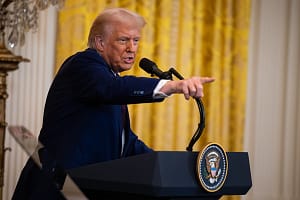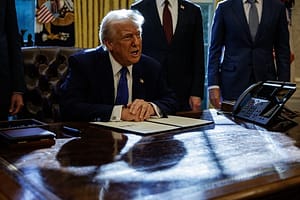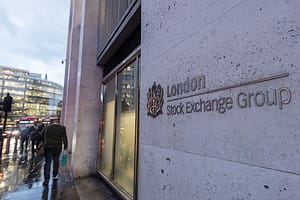Inexperienced online investors seeking to capitalise on Donald Trump’s tariff policies have been warned they risk losing their money.
Dan Buckley, Chief Analyst at DayTrading.com, says ‘armchair investors’ – those trading online from their own homes, usually holding stocks in ISAs and Self Invested Private Pensions (SIPPS), have been seeking to take advantage of market reactions to tariff announcements made by the US President over recent months.
Volatile markets have tempted many online investors to adopt a “Trump tariff’ strategy – trying to buy stocks cheaply following tariff announcements in the hope they recover from dips caused by announcement shocks.
Mr Buckley said: “Trump’s repeated tariff rhetoric has turned trade policy into a constant headline driver. It also creates volatility that retail trading platforms thrive on.
“Tariff speeches and social media posts trigger intraday swings across key sectors, especially across autos, energy and agriculture, which often leads to retail traders trying to scalp moves or use short-term options trades.
“Many novice traders have been whipsawed on options or leveraged trades, especially on stocks with global supply chains, and some even posted losses exceeding their margins because they’re essentially just gambling on the price movement.
“At the same time, the broad pro‑growth policies that are part of the Trump administration’s agenda – corporate tax cuts and deregulation – have helped sustain a long bull market that’s benefited passive individual investors.”
He warned independent online investors to be cautious and to do plenty of research before trying to make trades based on tariff volatility.
He said: “It’s like anything else. If you know what you’re doing, there are huge opportunities. For less-experienced investors using market headlines and volatility for speculation, it’s less likely to go well.”
President Trump caused shockwaves in stock markets in March when he first announced punitive tariffs on imports into the United States. These early announcements were followed by more detailed tariff announcements – each sending shockwaves through global markets.
Mr Buckley said: “March saw the biggest effects because those kinds of tariffs were not fully discounted into markets. When tariffs were announced on August 1, 2025, markets fell: the S&P 500 fell ~1.6%, Nasdaq declined ~2.2%, and the Dow lost ~1.2%.
“These swings often came with spikes in the VIX, or “fear index,” and large-scale rotation into safe havens like gold and US Treasuries.
Mr Buckley continued: “A lot of these moves are a reallocation of capital, rather than a destruction of it. This is the value of diversifying across assets, asset classes, countries, and currencies.”
He said retail trading platforms have done solid business since Mr Trump started introducing tariffs earlier this year. For example in Q2 2025, Robinhood’s users drove equity trading volume up 112%, compared to the same period the previous year. Options volume increased by 32%, resulting in 45% overall revenue growth.
The firm also reported a record $6.5 billion deposited by clients in April, as tariff-related volatility inspired more trading activity and more investors were interested in buying stocks that had taken a hit.
He continued: “Volatility creates both opportunity and challenge for retail investors. Robinhood users alone deposited a record $6.5 billion in April 2025 to buy fallen stocks and to trade tariff-driven swings.
Get real time update about this post category directly on your device, subscribe now.






Leave a Comment